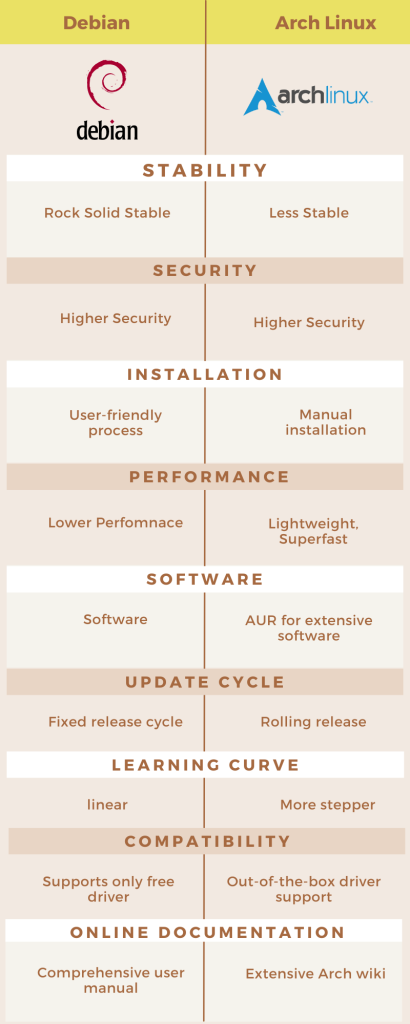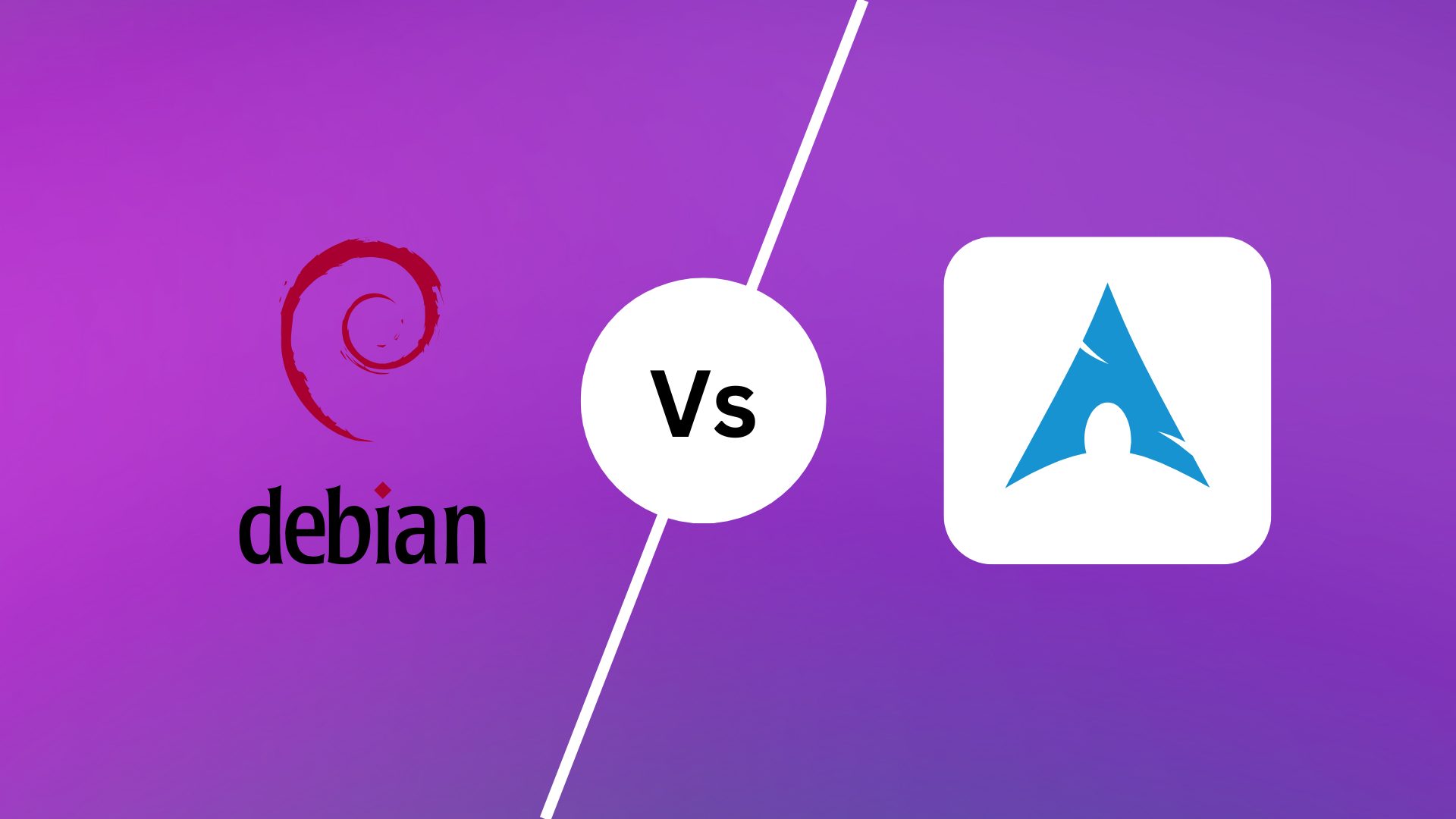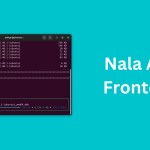When it comes to choosing a Linux distribution, there are numerous options available. Each distribution differs from one another in terms of philosophy, release cycle, customization, package management, and more. Selecting the right distribution reflects your personality and workflow in Linux.
Two popular choices for distribution are Debian and Arch Linux. Debian is known for its stability and reliability to the Linux community over a decade, whereas Arch Linux is recognized for its simplicity, user-centricity, versatility, and rolling release model of package management.
In this blog post, I will discuss a detailed comparison between Debian and Arch Linux, exploring various aspects such as stability and reliability, security, user interface, performance, update cycle, community support, personal experience, and more.
Table of Contents
Debian Vs Arch Linux

1. Philosophy
Debian and Arch Linux operate under different philosophies and principles, which define their target audience and purpose.
The Debian Philosophy
- Free Software: The Debian team focuses on free and open-source software (FOSS). As a result, the Debian repository contains only free software. If you are a FOSS enthusiast, you will definitely appreciate Debian.
- Stability and Reliability: Debian is renowned for its stability and reliability. Packages in Debian undergo extensive testing before being released to the stable branch. This makes Debian a popular choice for server environments. However, due to its focus on stability, Debian repositories often contain slightly outdated packages.
- Community Driven: Debian is developed, maintained, and operated by its dedicated community, without the backing of any major tech company.
The Arch Linux Philosophy
- Simplicity: Arch Linux follows the KISS (Keep it Simple, Stupid) philosophy. It prioritizes simplicity and flexibility, providing vanilla packages without modifications. In Arch Linux, users have full control over their system and are encouraged to solve their own problems by referring to the extensive Arch Linux wiki. The target audience of Arch Linux is advanced Linux users rather than beginners.
- User Centrality: While many distributions aim to be as user-friendly as possible by offering customized Linux desktop environments, Arch Linux has always been, and will remain, user-centric. Arch Linux empowers users to take charge of their system.
- Rolling Release Model: Arch Linux is primarily known for its rolling release model, which means that updates are released continuously and delivered to users as soon as they become available. There are no major distribution updates in Arch Linux; you install it once and update it forever.
2. Stability and Reliability
Debian Stability and Reliability
Debian is renowned for its stability. It is considered rock solid stable, making it a perfect choice for server and production environments. Debian packages undergo extensive testing before being released to the Debian repository. As a result, you may find Debian packages that are over two years old. However, the stable version of Debian may be too outdated for desktop users. If you desire a stable system without the worry of frequent breakages, Debian is the ideal choice.
Arch Linux Stability and Reliability
Arch Linux takes a different approach compared to Debian when it comes to shipping software packages. Arch Linux follows a rolling release model, with daily updates. The common cliché in the Linux community is that Arch Linux is prone to breaking after updates. However, in my more than one year of experience with Arch Linux, I have not encountered a single broken system. If you choose to use Arch Linux, regular system updates are crucial.
3. Security
Debian Security
Debian prioritizes security and has a dedicated security team that actively monitors and addresses vulnerabilities. Debian pushes security updates regularly to address known vulnerabilities.
Arch Linux Security
Arch Linux also places a high emphasis on security and provides regular security updates. However, due to its rolling release model, new updates may occasionally introduce bugs and security issues. Nonetheless, security issues in Arch Linux are rare.
4. Installation
Debian Installation
Debian provides an installation candidate for installing the distribution. The installation process is user-friendly and guided, making it easy to install Debian on your system.
Arch Linux Installation
Arch Linux does not provide an installation candidate for installing the distribution. Instead, you have to manually install Arch Linux. The Arch Linux installation process may seem overwhelming for new users, as it does not offer a graphical user interface (GUI). However, there are several Arch Linux scripts available for installing the distribution, which make it possible to install Arch Linux even for beginners.
5. Performance
Debian Performance
Linux is generally faster than other operating systems, and Debian is no exception. Debian comes with all the necessary software out of the box, including media applications and office apps. This inclusion of additional software may slightly impact Debian’s performance compared to Arch Linux.
Arch Linux Performance
In Arch Linux, users have control over what software to install and keep. Since Arch Linux does not come with bloatware, it often performs faster than other distributions. With up-to-date software, the performance of Arch Linux is consistently top-notch, making it more suitable for gaming. This is why Steam OS built its own Linux distribution on top of Arch Linux.
6. Software Availability
Debian Software Availability
Debian prioritizes free and open-source software. Its repository is one of the largest, containing thousands of packages to choose from. However, Debian only provides free and open-source software in its official repository. Nevertheless, thanks to its popularity, many organizations create proprietary software for Debian, and users can download packages from the company’s website.
Arch Linux Software Availability
The Arch repository contains both free and proprietary software. Arch Linux allows users to decide which software they want to use. Although the Arch official repository is smaller compared to other popular Linux distributions, the software availability is vast in Arch Linux. Thanks to the Arch User Repository (AUR), you can find almost any software ever made for Linux. Once you start using AUR, you will definitely appreciate its vast selection.
7. Hardware Compatibility
Debian Hardware Compatibility
Official Debian version focuses solely on free and open-source software, which means you may encounter incompatible hardware if you use any hardware that lacks a free driver, such as Nvidia graphics cards. However, you can opt for the Debian non-free community edition installation, which provides access to non-free drivers for your hardware, resolving most compatibility issues with Debian.
Arch Linux Hardware Compatibility
Arch Linux ships with both free and non-free drivers out of the box, ensuring hardware compatibility. Interestingly, certain Nvidia drivers are primarily built for Ubuntu, but you often have better success installing them on Arch Linux.
8. Update Cycle
Debian Update Cycle
Debian follows a well-defined but not fixed release cycle. Typically, it releases a stable version every two years, followed by two years of support. The LTS (Long Term Support) version receives an additional two years of support. Debian also provides testing and unstable branches alongside the stable release. The unstable version functions like a rolling release but is often a few months behind. The testing branch is usually stable but may contain bugs.
Arch Linux Rolling Release Model
Arch Linux is distinct from most Linux distributions, as it does not have major versions. Instead, Arch Linux follows a rolling release model, providing updates whenever a new stable version of a package becomes available. In Arch Linux, you do not have to worry about major distribution updates; you install the distribution once and update it indefinitely.
9. Community Support
Debian Community Support
Debian has a large and dedicated community responsible for maintaining and supporting the distribution. Unlike Ubuntu and Red Hat, Debian does not have a big corporation behind it. The Debian community is helpful and actively assists other users in solving problems. They maintain mailing lists, forums, and IRC channels where users can seek assistance, discuss, and collaborate.
Arch Linux Community Support
The Arch Linux community is known for being helpful and supportive of its users. Arch Linux users can seek assistance on community forums, IRC channels, and other platforms. Among all Linux distributions, Arch Linux has one of the most active user communities on Reddit, with dedicated users willing to help solve problems.
10. Online Documentation
Debian Online Documentation
Debian maintains an extensive user manual that covers everything from installing the distribution to maintaining it. The official documentation is comprehensive and well-maintained. Additionally, you can often find solutions to common problems on Ubuntu support forums, which are mostly applicable to Debian as Ubuntu is a Debian-based Linux distribution.
Arch Linux Wiki
The Arch Linux Wiki offers the most comprehensive documentation of any Linux distribution. It has received appreciation from the Linux community and helps users solve problems and expand their knowledge. The Arch Linux Wiki is known for its clear and detailed articles, covering a wide range of topics related to the distribution.
Which Distribution Is Right for You?
Choose Debian If:
- Stability and reliability are your top priorities.
- You prefer a well-defined release cycle and long-term support.
- You value ease of use and a user-friendly experience.
- You require a wide range of pre-compiled software packages.
Choose Arch Linux If:
- You desire a highly customizable Linux experience.
- You enjoy staying up-to-date with the latest software versions.
- You have a good understanding of Linux and prefer a do-it-yourself approach.
- You want the flexibility to choose your own desktop environment or window manager.
- You are comfortable troubleshooting and configuring your system.
Conclusion
Both Debian and Arch Linux have their own advantages and disadvantages. The decision of choosing a distribution is up to you. Debian provides a stable distribution, while Arch Linux offers a simple and up-to-date Linux distribution.






Bravo, this rather good idea is necessary just by the way